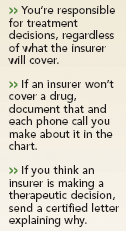Article
Insurer's decision, your responsibility
Author(s):
Malpractice Consult
A woman in her 60s suffers a small hemorrhagic CVA. She undergoes successful physical therapy, and after more than six months, her blood pressure is finally controlled with a three-drug regimen, including one drug at doses higher than the recommended dose. Eighteen months later, however, when she attempts to renew her medication, she's told that her insurance company will no longer cover the drug that is being used beyond recommended levels. She calls you, frantic about being without medication, and says she was told that you had to prescribe something else or lower the dose.

Insurance companies, by law and contract, can make coverage decisions: that is, they can decide what they will and won't pay for. If there's more than one treatment for a condition, they can choose to cover only the least expensive, as long as it's neither contraindicated nor proven to be ineffective. They can't dictate which treatment you should use. That's a therapeutic decision, for which it may be held liable. Here's a way to distinguish between the two types of decisions: In the example above, the insurance company approved the medication regimen, but not the dosage. This means the company was using its clinical judgment to demand a lower dose, not deciding which medication it would cover. As such, the insurer made a therapeutic decision.
Attorneys learned long ago that the best way to stay out of a malpractice action is to "paper" both the client and the opposition. After you've talked to your patient, document the situation in the chart and send a letter to the patient specifying your medical advice and what you're doing to persuade the insurer to re-evaluate its coverage decision.
Next, send a letter to the insurance company (preferably by certified mail) indicating your concerns, and detailing the possible consequences of its action. Tell the insurer that, in your opinion, the company is making a therapeutic decision, not a coverage decision, and explain why. Finally, send a courtesy copy of each letter or fax you send or receive to your patient. If you see significant potential for harm, get an opinion on the insurance company's decision from a healthcare attorney. The cost should be minimal, but sending a copy of the attorney's opinion to the insurance company may convince the company to reconsider.
The example above was a real situation and when, after three weeks of denials, the insurance company received a letter from an attorney placing the company on notice about its liability for its decision, the patient's medication was approved within one day.

The author is an internist and a health law attorney in Bala Cynwyd, PA. He can be reached by e-mail at eshore@shoremedlaw.com
.
This department answers common professional liability questions. It isn't intended to provide specific legal advice. If you have a question, please submit it to Malpractice Consult, Medical Economics, 123 Tice Blvd., Suite 300, Woodcliff Lake, NJ 07677-7664. You may also fax your question to 201-690-5420, or e-mail it to memalp@advanstar.com
.





